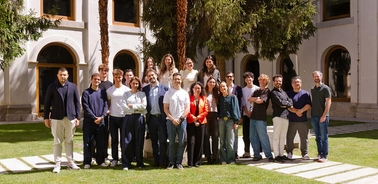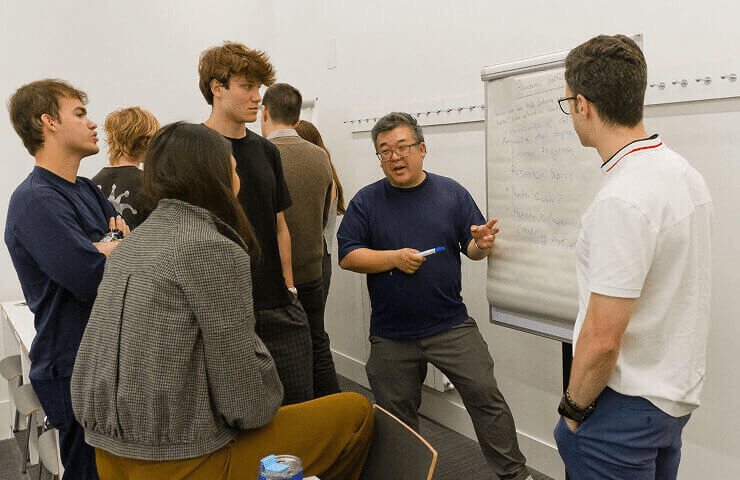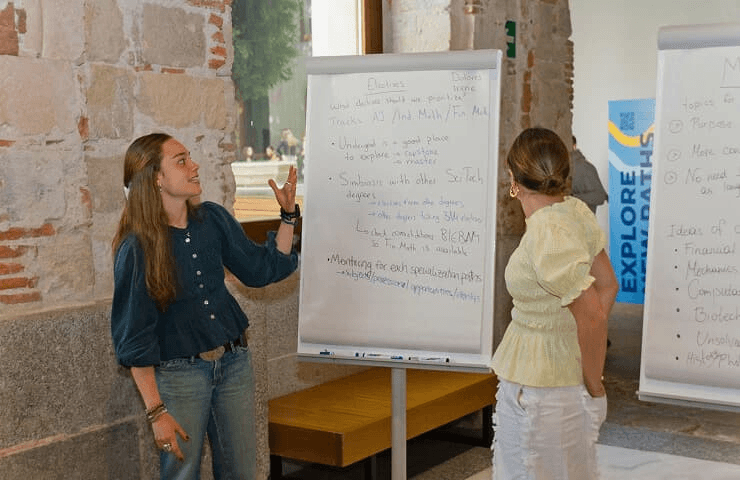BAM Advisory Board Shapes Future of Applied Mathematics Education at IE University

Expert Panel Reviews Curriculum and Partnerships.
Leading mathematicians, industry experts, and students gathered at IE School of Science & Technology’s Segovia campus on May 23rd for the Bachelor in Applied Mathematics (BAM) program's Advisory Board Meeting. The event brought together academics and professionals to evaluate and guide the future direction of one of the school’s most innovative undergraduate programs.
A Strategic Collaboration
The advisory board met on campus with a full-day agenda covering multiple focus areas. The group included Professor Sara Lombardo, Executive Dean of the School of Mathematical & Computer Sciences at Heriot-Watt University; Professor Alberto Enciso, Research Professor at ICMAT-CSIC; Professor Dolores Romero from Copenhagen Business School; Professor Ivana Ljubic from ESSEC Paris; and Javier García, Optimisation Engineering Manager at Ryanair. This composition aimed to balance theoretical expertise with applied industry insight, while ensuring student perspectives remained central to the discussions.
Student-Centered Innovation

Irene Alda, Academic Director of BAM, highlighted the strong impression the students made. "Besides a strong curriculum and all the opportunities IE offers, students are the core of the program. They are hungry for knowledge and to find their path on how they can contribute con su granito de arena—they definitely embody the 'stay hungry' phrase from Steve Jobs," she said.
Comprehensive Program Review
In the afternoon, the sessions shifted to industry partnerships, curriculum review, and other topics concerning the degrees. This went from discussions on course sequencing, allocation of sessions, and potential additions—such as physics-related courses and quantum technologies—to how to integrate industrial collaborations in the degree and best practices for final thesis projects.
Industry Integration and Future Partnerships
The discussion on capstone projects focused introducing an "industrial capstone" in the final year. This would involve students undertaking longer, in-depth projects in close collaboration with industry partners—allowing them to tackle real-world challenges while embedding themselves more deeply in professional environments.
Interdisciplinary Excellence
The board also examined how the BAM program delivers interdisciplinary education. The curriculum introduces students to programming and data visualization, in the first year, alongside core mathematical subjects. These foundations support more advanced courses in machine learning and mathematical modeling in later years.
"Real-world problem solving starts by being critical with your own work," Alda explained. "In a nutshell, having an intuition on where mistakes are and how to fix them is one key skill that our graduates will need in their future careers."
Looking Ahead
The advisory board meeting set the stage for further development of the BAM program, including ongoing feedback on academic enhancements and future decisions. The input gathered will support any curriculum updates while preserving the program’s distinctive balance of academic rigor and real-world relevance.
"It’s important for us that we deliver a high-quality education that is always complemented with great internships, entrepreneurship and research experiences," Alda said. "Every day, our goal for the program is to enable our students to meet real-world challenges in Maths through a perfect balance of theory and practice."
